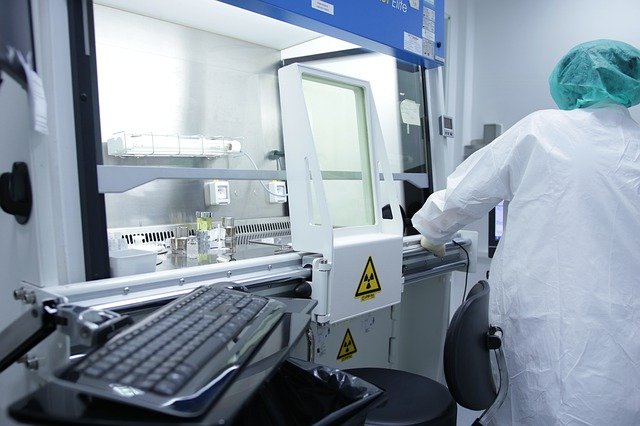Choose a career you love and you will never have to go to work.
Denis Waitley
There are two schools of thought when it comes to careers — go for the career that makes you the most money or for the one that brings you the most joy.
It is, however, possible to have both — although, speaking personally, I would always go for joy and personal satisfaction. If your passion also brings with it the opportunity to make money, even better.
Chemistry is one of those passions. A chemistry degree (whether it's a bachelor degree or a graduate degree) provides students with the scientific skills and knowledge to bring their personal interests into their job — whether that be in forensic science, engineering, environmental work, a technician role, health, materials development, analytical work or science education.
In the interim, though, while you are still in the midst of your degree, you might like to earn some extra cash. Sure, you can work a part-time job in retail or hospitality, but what about a job that indulges your passion?
One of the many benefits of starting work as a private chemistry tutor is the flexibility of the role. You find your ideal tutees, determine where and when you want to tutor and set your hourly rate. Not only can you earn extra cash fairly easily, but you're putting your skills and knowledge into practice and helping others while you're at it. Being a part of helping someone succeed can be very rewarding.
Even after you finish studying and you're working on building your future, you may want to continue tutoring part-time — particularly if you enjoy it.
This article is going to take a look at the opportunities a chemistry degree will give you, different chemistry jobs and the average starting salary for people entering chemistry careers.


Can I Be a Full-time Chemistry Tutor?
The short answer is yes. Plenty of people forge successful careers in tutoring.
According to talent.com, full-time tutors in Australia can earn from $59,000 a year for tutors who are new to the industry, up to $116,000 a year for tutors who have extensive experience. On average, most tutors earn around $78,500 a year, roughly equivalent to a rate of $40 an hour.
If this type of salary is one you feel you can manage — plus you love the flexibility of being able to work for yourself, the challenge of tutoring and the rapport you build with students — go for it. Make a start when you're still a student, then, make it a full-time job. The more experience you have, the more you can earn.
Other ways to increase your capacity to earn in your career as a chemistry tutor include:
- obtaining a teaching qualification — you may do a four-year Bachelor of Education degree, or a two-year postgraduate teaching degree; both will give you formal teaching qualifications
- specialising in a specific chemistry field — the more knowledge, skills and experience you have, the higher the hourly rate you can charge
- focus on university postgraduate students; the higher the level of education, the higher you can set your rate
- look for contract opportunities in the Australian government or private business sectors, offering skills development to groups.
How does your potential tutoring salary compare to a qualified teacher's salary in Australia?
What is a Teacher's Salary in Australia?
In Australia, the main difference between teacher jobs and tutor jobs is the possession of a formal teaching qualification. To teach in all government and private Australian schools — from preschool and primary school through to high school — you must have a Bachelor of Education degree or its postgraduate equivalent.
Another difference is salary, although this difference is not as significant as you may think.
Teacher salary in Australia varies between each Australian state because education is controlled by each individual Australian state rather than the Australian Federal Government. However, if we look at the average salaries for teachers, this gives us a good idea.
Teacher level and associated salaries work on a tiered system. Level 1 teachers have ten tiers; these represent pay scales. When they reach tier ten, the rate of pay stays the same until the teacher applies for a promotion. Each level of promotion also has a tier system, which we won't go into here; however, the promotion levels include level 1 'accomplished teacher', level 2 (higher duties), level 3 (deputy principal) and level 4 (principal).

If we just look at level 1 teachers, across Australia, the average rate of pay is $89,600 a year. Beginning teachers in their first year of permanent employment earn around $70,000, while teachers at the top of the tier system who have been graded as 'accomplished' and have higher duties, including team leadership, mentoring and administrative roles, can earn up to $160,000 a year on average.
While this is less than the average salary of a full-time tutor, particularly at the higher end of the scale, some people may find the flexibility of work hours to be a drawcard. It should also be noted that it does not matter what level of students or what subject a teacher is teaching; the rate of pay is the same — high school teachers are paid the same as primary school teachers; chemistry teachers earn the same as physical education teachers.
On the downside, if you work for yourself, you do not have access to sick pay, holiday pay or paid annual leave.
It is a big difference to weigh up when you're considering your career and financial future.
What if you decide that tutoring or teaching is not for you? What other chemistry careers are there?
What Chemistry Jobs Can I Do After Tutoring?
Not only will your chemistry degree or major prepare you for a wide range of chemistry jobs, but so too will any tutoring experience you have. Employers like to see that graduates have the knowledge and can apply it; part of applying your knowledge is the ability to transmit it effectively.
According to PayScale, Bachelor of Science graduates who have majored in chemistry tend to earn an average salary of $75,977 a year in Australia. The range, however, is broad and dependent on the industry you choose to enter.
Chemist
There are many different types of chemists, including analytical chemists, industry research chemists, synthetic chemists and medicinal chemists. An early career chemist, with between one and four years of experience, may earn an annual salary of $60,000.
Manager roles
Manager roles can be taken on even by early career graduates who can work as a Quality Assurance Manager or a Laboratory Manager among other jobs. A Quality Assurance Manager with between one and five years of experience can earn around $84,000 per annum. A Laboratory Manager with up to four years of experience will be paid an annual salary of around $73,000.
'Scientist' roles
This is a broad category with an equally broad range of average salaries. However, a small sampling of different scientist roles chemistry graduates from Melbourne University have undertaken in recent years include:
- research scientist (average annual entry level salary of $77,000)
- development scientist ($72,000)
- environmental scientist ($80,000)
- climate scientist ($84,000)
- forensic scientist ($70,000).
Scientists tend to move through the pay scales fairly quickly with projected average annual salaries for scientists with more than ten years of experience coming in at over $100,000.

Other chemistry careers
There are a host of other chemistry careers in addition to the main categories listed above. These include (but are in no way limited to):chemical consultant
- patent attorney
- policy advisor for government or private enterprise
- scientific editor
- environmental consultant
- chemical diagnostician
- laboratory technician
- quality control technician
- pharmacy assistant
- chemical engineer
- chemical pathology registrar.
Chemistry Australia
Chemistry Australia is a national body that represents the $40 billion chemistry industry in Australia. Members include professionals and workers from all chemistry careers as well as small to large businesses with an interest in the chemical industry.
As a national representative body, Chemistry Australia has a mission to work with both state and federal government, promoting conditions for growth, jobs and investment in the chemical industry.
Known as PACIA (Plastics and Chemical Industry Association) until 2017, Chemistry Australia has been representing chemists, scientists and other workers in the industry for over 22 years.
As a member of Chemistry Australia, you can access specialist support, information, networking opportunities and resources, as well as being offered regular opportunities to have your voice heard.
Chemistry ought to be not for chemists alone.
Miguel de Unamuno
Summarise with AI:











